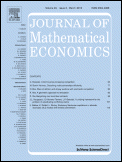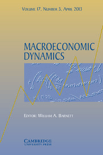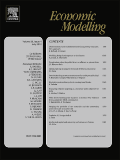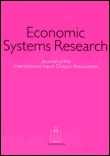
Computational Economics
Scope & Guideline
Empowering Economists with Cutting-Edge Computational Research.
Introduction
Aims and Scopes
- Computational Modeling in Economics:
The journal emphasizes the development and application of computational models to simulate economic behaviors and phenomena, including agent-based models and dynamic stochastic general equilibrium (DSGE) models. - Machine Learning Applications:
There is a strong focus on the use of machine learning techniques for various economic analyses, including forecasting, risk assessment, and optimization of financial portfolios. - Financial Economics and Risk Management:
A significant portion of research is dedicated to financial economics, particularly in areas such as option pricing, portfolio management, and the analysis of financial markets using computational techniques. - Behavioral Economics and Decision Making:
Research also explores the intersection of computational methods and behavioral economics, examining how psychological factors influence economic decision-making through computational simulations. - Environmental and Resource Economics:
Studies often address the economic implications of environmental policies, sustainability, and resource allocation, integrating computational models to analyze these complex interactions. - Policy Analysis and Economic Forecasting:
The journal provides insights into economic policy analysis and forecasting, leveraging computational tools to simulate the effects of various policy decisions on economic outcomes.
Trending and Emerging
- Integration of AI in Economic Forecasting:
Recent studies increasingly leverage artificial intelligence and machine learning algorithms to enhance the accuracy of economic forecasting, signaling a trend towards data-driven decision-making in economics. - Cryptocurrency and Digital Assets Analysis:
There is a growing body of research focused on cryptocurrencies and digital assets, exploring their pricing dynamics, market behavior, and implications for traditional finance, reflecting the rising interest in decentralized finance. - ESG (Environmental, Social, Governance) Factors in Finance:
Emerging research emphasizes the importance of ESG factors in financial decision-making, with computational methods being employed to optimize investment strategies based on sustainability metrics. - Dynamic Network Analysis:
The use of network analysis to understand interdependencies in financial markets and economic systems is on the rise, reflecting a trend towards examining complex relationships through computational frameworks. - COVID-19 Impact Studies:
Research addressing the economic impacts of the COVID-19 pandemic has surged, with a focus on modeling the effects of health crises on financial markets and economic stability, utilizing advanced computational techniques.
Declining or Waning
- Traditional Econometric Models:
There has been a noticeable shift away from classical econometric models towards more innovative computational methods, such as machine learning and agent-based modeling, indicating a decline in the use of traditional statistical techniques. - Static Economic Models:
Research focusing on static models, which do not account for dynamic changes in economic environments, has decreased as the demand for dynamic, adaptive models has increased. - Simple Regression Analysis:
The reliance on basic regression analysis has diminished in favor of more sophisticated modeling techniques that can capture complex relationships and interactions in economic data. - Theoretical Economic Frameworks:
There is a waning interest in purely theoretical economic frameworks that lack computational applications, as researchers increasingly seek to validate theories through empirical and computational methods. - Macroeconomic Stability Studies:
Research centered on macroeconomic stability without computational innovation has seen a decline, as the focus has shifted towards more nuanced analyses that incorporate agent-based dynamics and machine learning.
Similar Journals

NETWORKS & SPATIAL ECONOMICS
Bridging Disciplines for a Smarter Economic FutureNETWORKS & SPATIAL ECONOMICS, published by SPRINGER, stands at the forefront of research within the disciplines of artificial intelligence, computer networks, and software engineering. With an ISSN of 1566-113X and E-ISSN 1572-9427, this esteemed journal boasts an impressive impact factor and is recognized in the Q2 and Q3 quartiles in its respective categories for 2023. As a vital resource for researchers and professionals, it offers a dynamic platform for disseminating innovative findings that explore the intersections of spatial economics and network theory. The journal has evolved significantly since its inception in 2005, with its convergence period extending to 2024, showcasing its commitment to advancing scholarly discourse and providing access to critical advancements in the field. Aimed at academics, practitioners, and students alike, NETWORKS & SPATIAL ECONOMICS is essential for anyone seeking to deepen their understanding of how spatial frameworks and network dynamics influence economic systems.

JOURNAL OF MATHEMATICAL ECONOMICS
Transforming Economic Theory with Mathematical Innovation.JOURNAL OF MATHEMATICAL ECONOMICS, published by Elsevier Science SA, is a premier journal that bridges the gap between mathematics and economics, making significant contributions to both fields since its inception in 1974. This journal is dedicated to publishing high-quality research that applies mathematical methods to solve complex economic problems, thus nurturing an interdisciplinary dialogue essential for advancing both theoretical and practical applications in economics. With an impact factor that reflects its esteemed position (Q2 in Applied Mathematics and Economics and Econometrics as of 2023), the journal ranks prominently within its categories, promoting rigorous analysis and innovative methodologies. The Journal of Mathematical Economics invites contributions from researchers, professionals, and students alike, providing a platform for the dissemination of cutting-edge research that shapes economic thought and policy. Operating without open access, it remains a crucial resource for anyone keen to delve deeper into the mathematical foundations of economic theory, while it continues to evolve and maintain relevance through 2024 and beyond.

MACROECONOMIC DYNAMICS
Innovating Research for a Dynamic Economic FutureMACROECONOMIC DYNAMICS, a distinguished academic journal published by Cambridge University Press, serves as a pivotal platform for innovative research in the fields of economics and econometrics. With its ISSN 1365-1005 and E-ISSN 1469-8056, the journal has been at the forefront of scholarly communication since its inception in 1997, offering an extensive range of articles that explore dynamic economic models, policy impacts, and theoretical advancements through the latest empirical analyses. Currently holding a Q2 ranking within the 2023 Economics and Econometrics category, and positioned at rank #409 out of 716 within Scopus, it is an essential resource for researchers, professionals, and students alike, looking to stay updated on critical developments in macroeconomic theory and practice. Although it follows a traditional subscription model rather than Open Access, the journal continually strives to disseminate high-quality, peer-reviewed content that informs and inspires the global economics community. The importance of MACROECONOMIC DYNAMICS lies in its commitment to fostering a deeper understanding of economic phenomena, making it a must-read for anyone engaged in the complexities of the economic landscape.

ECONOMIC MODELLING
Advancing Economic Insights Through Rigorous Modelling.ECONOMIC MODELLING, published by Elsevier, is a leading academic journal in the field of Economics and Econometrics, with a commendable impact factor that underscores its significance within the research community. Since its inception in 1984, this journal has been pivotal in disseminating high-quality research that contributes to the advancement of theoretical and empirical methodologies in economics. As a Q1 journal in its category, it ranks in the top 88th percentile according to Scopus, solidifying its reputation as an influential platform for economists and academicians. Although it does not offer open access, the journal maintains a robust subscription model, ensuring wide distribution of critical insights and findings. Researchers, practitioners, and students are encouraged to engage with the latest developments in economic modelling, making ECONOMIC MODELLING an essential resource for anyone seeking to understand and contribute to the evolving landscape of economic theory and application.

Economic Systems Research
Innovating Understanding in Economic InteractionsEconomic Systems Research, an esteemed journal published by Routledge Journals, Taylor & Francis Ltd, is a pivotal platform within the field of economics and econometrics, focusing on the complexities of economic systems and their interactions. Established in 1989, it has maintained a robust publication cadence, converging towards 2024, and has earned a notable standing with a 2023 Scopus ranking placing it in the 79th percentile among its peers, categorized as Q2 in the competitive landscape of Economics and Econometrics. This distinction underscores its impact and relevance in disseminating quality research. With a commitment to advancing the understanding of economic dynamics, the journal serves as a vital resource for researchers, professionals, and students seeking to explore innovative frameworks and empirical analyses within economic systems. Although it offers traditional subscription access, the journal's wealth of knowledge is crucial for those keen on contributing to and staying abreast of the latest developments in the discipline.

THEORY AND DECISION
Illuminating the Pathways of Decision-Making Through ResearchTHEORY AND DECISION is a prestigious academic journal published by SPRINGER, which has been a cornerstone of interdisciplinary research since its inception in 1970. With an ISSN of 0040-5833 and an E-ISSN of 1573-7187, this journal offers valuable insights into a range of fields, including Applied Psychology, Decision Sciences, Economics, and more. Holding a remarkable position within various quartile rankings, such as Q1 in Arts and Humanities and Q2 in Economics, it signifies the journal's impact and relevance in modern academic discourse. Although not presently open access, it remains accessible to researchers and institutions that prioritize impactful studies and theoretical advancements. The journal's objectives include exploring decision-making processes and theoretical underpinnings that inform practical applications across disciplines, making it an essential resource for academics, professionals, and students dedicated to advancing knowledge in their respective fields. THEORY AND DECISION continues to shape the landscape of interdisciplinary research, providing a platform for innovative ideas and discussions that are crucial in today’s complex world.

Economic Theory Bulletin
Bridging theory and practice for a deeper understanding of economics.Welcome to the Economic Theory Bulletin, a premier journal dedicated to advancing the field of economic theory. Published by SPRINGER HEIDELBERG, this journal serves as a critical platform for researchers and professionals to disseminate innovative ideas and research findings that shape economic discourse. With an ISSN of 2196-1085 and an E-ISSN of 2196-1093, the Economic Theory Bulletin invites contributions that address theoretical advancements and empirical applications in economics, fostering insightful dialogue among scholars. Although the journal operates under a traditional access model, it remains committed to high-quality, peer-reviewed scholarship that meets the rigorous standards of the academic community. The diverse range of articles published here not only contributes to the theoretical foundations of economics but also emphasizes real-world applications, making it an essential resource for students and professionals alike. The journal’s impact on the evolving landscape of economic theory ensures that it remains a vital reference point for the latest research and trends in the field.

B E Journal of Macroeconomics
Illuminating contemporary issues in macroeconomic theory.B E Journal of Macroeconomics is a distinguished academic journal published by WALTER DE GRUYTER GMBH that serves as a critical platform for advancing the field of macroeconomic research. Established in 2001, it has gained recognition within the economics community, featuring a broad range of theories and empirical studies relevant to contemporary economic issues. With an impact factor reflective of its academic contributions, the journal is categorized in the Q3 quartile for Economics and Econometrics, ranking 607 out of 716 in its field according to Scopus metrics. The journal's scope includes a comprehensive exploration of macroeconomic trends, policy analysis, and the dynamics of economic systems, catering to researchers, practitioners, and students alike. Though primarily published in a traditional format, researchers have ample opportunities to access its invaluable content through institutional subscriptions, ensuring the dissemination of knowledge across the global economic landscape. Located in Berlin, Germany, B E Journal of Macroeconomics not only enriches the academic discourse but also fosters a deeper understanding of macroeconomic phenomena, making it an essential resource for anyone engaged in the field.

American Economic Journal-Macroeconomics
Unraveling Complexities of Economic DynamicsAmerican Economic Journal-Macroeconomics, published by the American Economic Association, stands at the forefront of economic research, addressing pivotal macroeconomic issues that shape global economies. With an impressive Scopus rank of #8 out of 288 in its field and a notable 97th percentile ranking, this journal is widely regarded as a top-tier publication, specifically categorized in the Q1 category for Economics, Econometrics, and Finance as of 2023. Operating under ISSN 1945-7707 and E-ISSN 1945-7715, it aims to disseminate high-quality research from 2009 through 2024 and beyond, providing crucial insights into macroeconomic theory and policy. Although the journal currently does not operate under an open access model, it remains a vital resource for researchers, economists, and students seeking to deepen their understanding of macroeconomic dynamics and their implications for economic policy worldwide. The journal's impactful contributions make it an essential read for those striving to influence economic thought and practice.

Computational Management Science
Exploring the Intersection of Technology and Management ScienceComputational Management Science, published by SPRINGER HEIDELBERG, is a significant journal catering to the intersection of technology, management, and decision sciences. With an ISSN of 1619-697X and E-ISSN 1619-6988, this journal serves as a platform for innovative research focusing on computational methods applied to management science, operations research, and information systems. Based in Germany, the journal spans a critical period from 2005 to 2024, emphasizing trends that shape the future of the field. As a Tier 3 journal in multiple categories including Business, Management, and Accounting, and ranked across various disciplines with Scopus rankings highlighting its relevance, it stands out in fostering scholarly discourse. The journal invites contributions that enhance the application of computational techniques in decision-making, thereby enriching the practices of both academics and industry professionals. While it currently does not offer open access, its influence is reflected in its established readership and community engagement. Researchers, practitioners, and students alike will find in this journal a vital resource for advancing knowledge and sparking innovation in computational management.